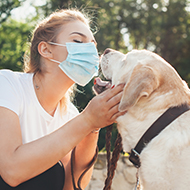
Animal charity helped thousands of pets and owners during difficult times.
Today marks an entire year since the start of the first lockdown and charity Blue Cross is reflecting on how it has drastically changed its methods of operation in order to continue supporting pets and owners at a time when pet rehoming and veterinary services were closed or drastically reduced.
The charity has taken in almost 3,500 animals since the start of the first lockdown and demand for rescue pets has continued to rise. In May 2020 Blue Cross saw a 515 per cent increase in online applications for dogs, prompting the creation of the ‘home direct‘ scheme.
This scheme utilises foster carers across the country, who take animals into their homes while Blue Cross searches for a forever home. It has resulted in more than 3,000 cats, dogs, small pets and horses finding loving new homes.
Sian Sharples, Blue Cross rehoming service delivery partner said: "We were overwhelmed by offers of support when we put out a call for volunteers to help us care for homeless pets when our centres were forced to close.
“We minimised staff at sites who were still needed to care for the homeless pets so we are so grateful to all those who came forward to volunteer for us, we simply couldn’t have helped the number of pets we did over this time and we are so grateful for all their support.“
Like millions of other veterinary practices, Blue Cross' animal hospitals had to move to providing emergency care only, leading the charity to launch virtual appointments so that non-urgent cases could be handled safely and animals could still receive the medication and care they needed.
More than two-thirds of the 70,000 plus consults that took place during the last year did so virtually through telephone or video.
The charity has also continued to help and educate current and future pet owners through its virtual talks and workshops, which reached more than 28,500 children and young people over the pandemic. As well as its new animal behaviour line, which has received more than 500 calls so far since its launch last April.



 The Veterinary Medicines Directorate (VMD) is inviting applications from veterinary students to attend a one-week extramural studies (EMS) placement in July 2026.
The Veterinary Medicines Directorate (VMD) is inviting applications from veterinary students to attend a one-week extramural studies (EMS) placement in July 2026.